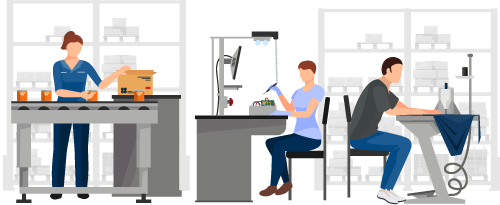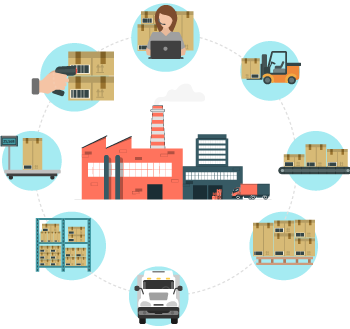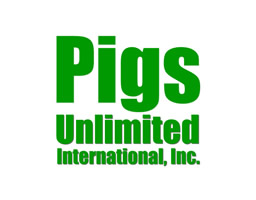Unlocking Growth Potential with Small Business Manufacturing Software
Built For




According to the U.S. Census Bureau, Statistics of U.S. Businesses, in 2020, there were 239,607 firms engaged in manufacturing in the United States, and 98% of the firms had less than 500 employees. Furthermore, 74% of the firms had fewer than 20 employees. Considering the substantial presence of small manufacturing firms within the United States manufacturing industry, it comes as no surprise that the domain of small business manufacturing software is experiencing significant growth within the software industry.
Understanding small manufacturing business software

What is a small manufacturing business?
The United States Small Business Administration (SBA) states that manufacturing companies with 500 employees or fewer qualify as small businesses.
A manufacturing business refers to a company that uses raw materials, parts, or components to produce, assemble, or refurbish goods. The finished goods are sold to businesses, consumers, wholesalers, distributors, or other manufacturers. Many small manufacturing businesses focus on niche markets, specialized products, or customized manufacturing services to distinguish themselves. Small manufacturing businesses often possess agility and flexibility, allowing a quick response to market demands and customer needs.
What is small manufacturing business software?
Small business manufacturing software supports and streamlines the operations of small manufacturing businesses and encompasses a range of tools and functionalities that assist in managing various aspects of the manufacturing and business management process, such as production, inventory management, quality control, procurement, and distribution. Small business manufacturing software helps growing small manufacturers enhance operational efficiency, improve productivity, reduce costs, ensure regulatory compliance, and make informed decisions for sustainable growth.
Navigating the obstacles: Challenges faced by small manufacturing businesses

While small manufacturing businesses face numerous challenges that can impact their operations and growth, several challenges are common among many small manufacturers:
Limited resources
Limited resources are frequently a challenge for small businesses, which can restrict their ability to invest in equipment, inventory, skilled labor, and marketing efforts.
Competition
Small manufacturers often compete with larger companies with greater economies of scale, established market presence, and extensive resources. Competing against these giants can be challenging, especially regarding pricing and distribution.
Cost management
Managing production costs, including raw materials, labor, and overhead expenses, is critical for small manufacturers. Balancing cost-efficiency without compromising product quality can be a constant struggle.
Supplier and inventory management
Coordinating with suppliers and ensuring timely delivery of raw materials can be complex, especially for small manufacturers with limited negotiating power and influence over suppliers.
Compliance and regulations
Small manufacturers must comply with various regulations related to safety, environmental standards, labor laws, and product certifications. Ensuring compliance can be time-consuming and difficult.
Access to capital
Securing funding for business expansion, purchasing equipment, or investing in research and development can be difficult for small manufacturers, as they may have limited access to traditional financing options.
Economic volatility
Changes in consumer demand, economic fluctuations, and global market dynamics can significantly impact small manufacturing businesses. Adapting to these changes and maintaining stability can be demanding.
While these challenges can be daunting, small manufacturers can overcome them through strategic planning, innovation, collaboration, implementing cost-cutting measures, and leveraging available resources and technologies.
Harnessing technology and software for small business manufacturing solutions

Small business manufacturing software plays a pivotal role in addressing the challenges of limited resources, cost and inventory management, regulatory compliance, and forecasting consumer demand faced by small manufacturing businesses.
Several key areas where software can make a significant impact include:
Streamlining production processes and workflows
Small business manufacturing software revolutionizes small manufacturers’ operations by enabling them to streamline production processes and automate previously manual tasks. Implementing barcoding and workflow tracking eliminates time-consuming manual efforts, resulting in optimized workflows, reduced errors, improved consistency, and, ultimately, increased productivity. By leveraging barcode scanning technology, manufacturers automate data entry and retrieval, eliminating the need for manual recording and reducing the likelihood of human errors. This automation saves valuable time and resources and ensures higher accuracy in manufacturing operations.
Improving materials and inventory management
Efficient management of raw materials and inventory is vital for small manufacturers. By adopting small business manufacturing software with advanced inventory management, manufacturers optimize stock levels, streamline reordering processes, track inventory in real-time, reduce carrying costs, and mitigate the risk of stockouts or overstocking.
Ensuring quality control and traceability
Small business manufacturing software plays a crucial role in assisting manufacturers with ensuring quality control and traceability throughout their production processes. Control measures to track products and meet regulatory requirements at various stages of production allow for real-time monitoring and identification of defects or deviations. With comprehensive documentation and record-keeping functionalities, manufacturers can track and trace each product’s journey, from raw materials to finished goods, ensuring complete traceability. Traceability proves invaluable in product recalls or audits, as manufacturers can quickly identify affected products and take necessary corrective actions.
Gaining organizational visibility
Manufacturers gain comprehensive visibility into their production processes, inventory levels, supply chain activities, and financial performance by centralizing inventory, orders, customers, and manufacturing process information. Real-time dashboards and reporting features enable managers and decision-makers to access critical data and key performance indicators at a glance, facilitating informed decision-making. Small business manufacturing software provides transparency and insights into production efficiency, resource utilization, and performance metrics. With increased visibility, manufacturers identify bottlenecks, streamline operations, and optimize resource allocation. By having a holistic view of the organization, small manufacturers proactively identify areas for improvement, align strategies with business objectives, and drive operational excellence.
Enhancing customer relationship management
By consolidating and organizing customer data, small manufacturers deliver more personalized experiences, enhance customer satisfaction, and nurture long-term relationships. Customer relationship management enables businesses to comprehensively understand their customers, including their preferences, purchase history, and interactions with the company. This wealth of information allows manufacturers to tailor their offerings and communication to meet specific customer needs.
Optimizing supplier management and procurement
Small business manufacturing software significantly enhances tracking, evaluating, and collaborating with suppliers and vendors, optimizing this critical aspect of their operations. With real-time access to supplier information and performance metrics, manufacturers improve sourcing decisions, forecast demand, maintain strong supplier relationships, ensure timely deliveries, and mitigate risks associated with supply chain disruptions. Small business manufacturing software empowers manufacturers to enhance operational efficiency, reduce costs, and drive overall business performance through effective supplier and vendor management.
Optimizing distribution
By streamlining the distribution process, manufacturers improve operational efficiency, reduce costs, and meet customer demand with greater accuracy and speed. Small business manufacturing software:
- Consolidates orders from multiple channels, including EDI, eCommerce, and direct sales.
- Automates order processing, facilitating faster order fulfillment.
- Integrates with logistics providers and shipping carriers, simplifying the tracking and management of shipments.
- Provides valuable analytics and reporting capabilities, allowing manufacturers to gain insights into distribution patterns, optimize routes, and identify opportunities for cost savings.
By embracing software solutions, manufacturers overcome challenges, reduce costs, optimize operations, improve resource allocation, and drive growth. Leveraging small manufacturing business software enables manufacturers to adapt to evolving industry landscapes, enhance competitiveness, and foster sustainable success.
Exploring manufacturing methods: Understanding the different approaches in production

Multiple manufacturing methods refer to different approaches or processes employed in producing goods. Common manufacturing methods include:
Discrete manufacturing
Discrete manufacturing involves the production of distinct, individual items. Each unit is typically unique and produced separately, such as in the case of automobiles or electronics.
Process manufacturing
Process manufacturing focuses on producing goods through a continuous or semi-continuous process and involves combining raw materials or ingredients. Industries like food processing, pharmaceuticals, and chemicals often employ process manufacturing.
Batch manufacturing
Batch manufacturing produces goods in specific quantities or batches. A batch is a defined quantity of products produced together, often following a specific recipe or formula. Batch manufacturing is commonly used in the cosmetics, pharmaceuticals, and food production industries.
Custom manufacturing
Custom manufacturing refers to producing goods tailored to meet individual customer requirements. Each item is made to the customer’s specifications, often involving customization or personalization.
Job shop manufacturing
Job shop manufacturing involves producing goods based on specific customer orders or projects and typically involves handling unique or low-volume orders, with each job requiring a different set of processes and materials.
Engineer-to-Order (ETO) manufacturing
ETO manufacturing involves designing and producing products based on customer specifications. Manufacturers in industries like construction, aerospace, or machinery often follow this method, creating custom products to meet unique customer needs.
Make-to-Stock (MTS) manufacturing
Make-to-stock manufacturing produces goods in anticipation of customer demand. Finished products are made in advance and stocked in inventory, ready for immediate delivery when orders are received.
Assemble-to-Order (ATO) manufacturing
Assemble-to-order manufacturing, also called made-on-demand, involves assembling products based on standard components or subassemblies according to customer specifications. ATO offers a degree of customization while using pre-existing components.
Key features and functionalities of software for small business manufacturing

At the core of small business manufacturing software lies a comprehensive system that seamlessly integrates production, inventory management, purchasing, and order management functionalities. The software enables manufacturers to control and track inventory levels, simplify purchase processes, efficiently manage orders throughout the production cycle, and efficiently manage distribution. These interconnected functionalities provide small manufacturers with end-to-end control over their inventory, purchasing, and order management processes, optimizing efficiency and driving operational success.
In addition to core features, small business manufacturing software supports specialized manufacturing production methods, including:
Multiple manufacturing methods
Manufacturing methods, such as discrete, process, batch, or custom, vary in their approach and requirements, and software that supports multiple manufacturing methods provides manufacturers the flexibility to adapt their production processes to specific industry needs and customer demands.
Multi-level bill of materials
A bill of materials (BOM) is a hierarchical representation of the components, subassemblies, and raw materials required to manufacture a finished product. A BOM outlines the structure and relationship between the different levels of items involved in the production process. Each level within the BOM represents a specific stage of assembly, where higher-level items are comprised of lower-level items.
Workflow management
Workflow management allows manufacturers to define and manage manufacturing workflows, including task assignments, approvals, and notifications, ensuring smooth coordination and efficient execution of production processes.
Batch and process manufacturing support
For batch or process manufacturers, small business manufacturing software includes features tailored to handle specific requirements, such as recipe management, batch tracking, yield calculation, and process optimization.
Kitting
Kitting is a process that allows companies to offer products as a unified entity, even though they are made up of multiple components. Kitting is achieved by assembling the components when the product is shipped or creating them on demand. Kitting is particularly useful when products require straightforward assembly or when an assortment of components is sold as a single unit for a specific order. The components are selected from inventory based on an associated Bill of Materials (BOM) during the picking process. By adopting kitting instead of traditional assembly methods, the components are not assigned to a specific finished product until an order is received.
Assembly
During an assembly process, a new product is formed by utilizing components from inventory, which are subsequently depleted, and the finished product is added to the inventory of completed goods. The components required for the assembly may be procured from one or multiple vendors and, upon arrival, are recorded in the inventory system. Once all the necessary components have been received, they are used to create the assembled product. As a result of this creation, the components used in the assembly are deleted from the inventory, while the newly formed product is added to replenish the inventory of finished goods.
Lot and serial number traceability
Lot traceability and serial number traceability enable manufacturers to track and trace products and components using lot and serial numbers, ensuring visibility and accountability throughout the supply chain, facilitating recalls, and supporting compliance with regulatory requirements.
Unlocking success: Inspiring stories of small manufacturing businesses empowered by software

Optimized operations: Pigs Unlimited’s small manufacturing businesses software success
The ability to quickly produce high-quality pipeline products gives Pigs Unlimited, a manufacturer and distributor of pipeline pigs and pigging products, a competitive edge. However, they faced challenges managing inventory and coordinating departments across different locations.
Each shop had their own whiteboard, and then the salespeople would have to go to the different shops to see what we actually had in stock – they’d have to go across the parking lot to get to the other shop to see that whiteboard. Whether or not the whiteboard had been updated since yesterday or whenever that information was all we had.
Lauren Barrera, Controller, Pigs Unlimited
It wasn’t accurate and our salespeople were having a hard time giving quotes to customers and seeing what was actually available or finding lead times with that because the shop supervisor was too busy trying to keep up with the whiteboard to really be able to be as involved in the shop. Now with Acctivate, he is able to be involved, and we can give accurate lead times easily.”
After implementing small business manufacturing software, all departments gained real-time access to the same system, improving synchronization and efficiency. The software streamlines purchasing processes, preventing double ordering and over-ordering, while the sales team provides accurate information on product availability and lead times. The software’s kitting feature saves time and improves accuracy in the shop, as the bill of materials for each product is stored in the system. The flexible pricing functionality allows for customized pricing, and the reporting capabilities provide critical data for decision-making. The software facilitates return merchandise authorization processing and customer relationship management and offers extensive help and support resources.
Boosting efficiency and gaining visibility: AP Tech Group’s success story
AP Tech Group, a manufacturer of solid water treatment products for industrial cooling and heating equipment, faced challenges managing inventory and order fulfillment as their SKUs grew. To overcome these challenges, AP Tech Group searched for small business manufacturing software that would integrate with their existing financial software, QuickBooks.
Over the last year and a half, we’ve definitely increased our sales and there has not been any time increase. Everything was all manually entered before Acctivate. Acctivate has saved a lot of time in just passing paperwork from person to person. Now it’s entered into the database, we can pull it in a report, and we can always look it up. We were filing these physical pieces of paper and tracking that down in file cabinets was tedious. All data is available within the SQL database, so it’s all accessible in any kind of customized report we want to do.”
Trey Tolbert, Operations Coordinator, AP Tech Group
AP Tech Group experienced immediate benefits in managing their production and inventory, and improving customer satisfaction by implementing small business manufacturing software. With the software, AP Tech Group tracks lot and serial numbers, leading to better visibility and cost management, and also optimized order fulfillment processes, reducing shipping errors and streamlining the picking and shipping processes. The integration with shipping carriers enables instant access to tracking numbers, saving time and improving customer service. Overall, the software provides AP Tech Group with increased visibility, efficiency, and stability, enabling them to grow their sales while saving time and improving accuracy in their operations.
Call us at 817-870-1311


